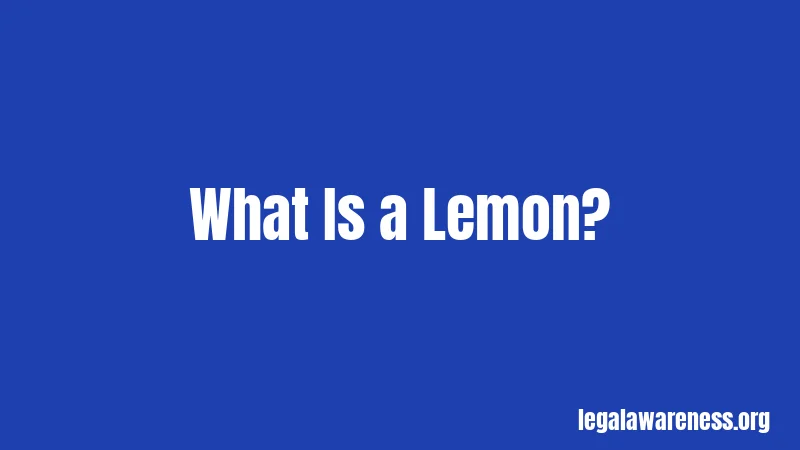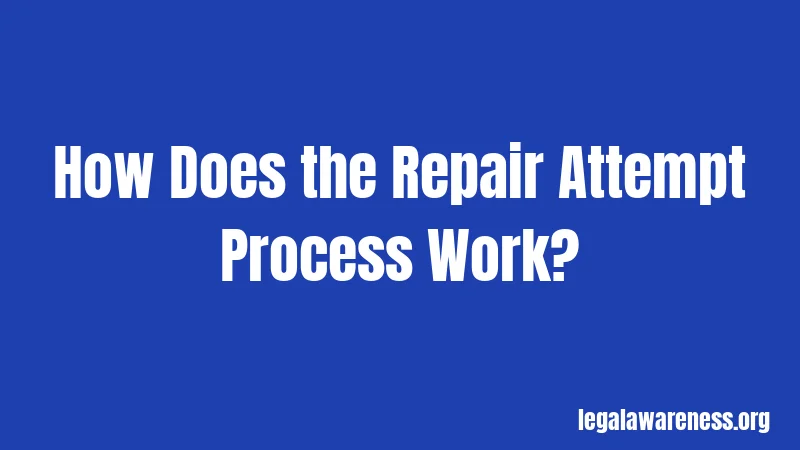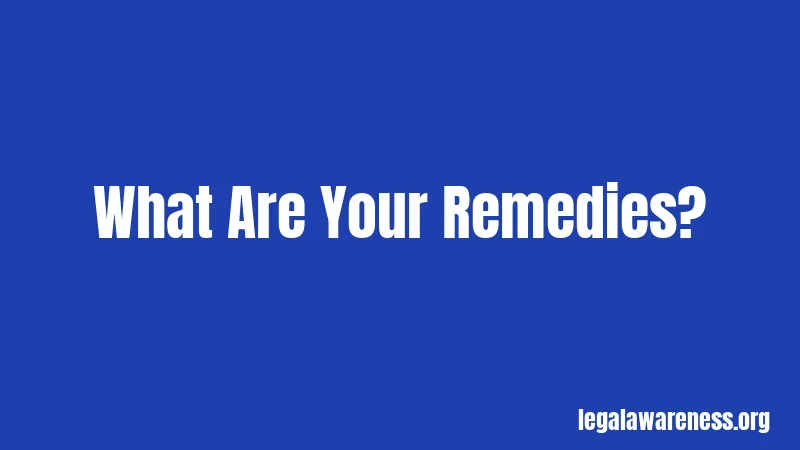Wisconsin Lemon Laws in 2026: Consumer Protection When It Counts
Most people have no idea this is even legal. Seriously. But in Wisconsin, lemon law is real, and it protects you more than you might think. If you bought a new car with serious defects, Wisconsin’s got your back. Let’s break down exactly what you need to know.
The Wisconsin lemon law is one of the most consumer-friendly in the country. That’s right—if you’re stuck with a broken car that the manufacturer can’t fix, you have actual legal remedies. You might get a refund, a replacement vehicle, or money. The key? Understanding how this law works and when you can use it.
What Is a Lemon?

In legal terms, a lemon isn’t just any broken car. A lemon is a vehicle with a “nonconformity,” which means any defect covered by the manufacturer’s warranty that substantially impairs the use, value, or safety of the vehicle.
Think of it like this: a scratch on your bumper? Not a lemon. An engine that keeps stalling at red lights? That’s a lemon. Brakes that don’t work right? Definitely a lemon.
The defect has to be serious. It can’t just be annoying. It has to make the vehicle actually unsafe or useless. Honestly, this is the part most people misunderstand. Not every problem qualifies.
What Does Wisconsin’s Lemon Law Cover?
Okay, pause. This part is important. Wisconsin’s lemon law covers certain vehicles, but not all of them.
You’re covered if you bought a new motor vehicle from a dealer in Wisconsin. This includes demonstrator vehicles (cars used on the lot to show customers). The law also covers leased vehicles. Think of it like a safety net—if you’re driving a defective new car in Wisconsin, you’re probably protected.
Here’s what it does NOT cover. Used cars are not lemons under this law. Neither are mopeds or trailers. If you bought your vehicle outside Wisconsin and took delivery outside the state, this law doesn’t apply. But if you bought it in Wisconsin (or accepted the vehicle here), you’re likely covered.
The vehicle must still be under the manufacturer’s warranty when you report the problem. Usually, that means within one year of the date you took delivery.
How Does the Repair Attempt Process Work?

Stay with me here. Wisconsin’s lemon law is actually pretty simple, but it has specific steps.
First, you need to report the defect to the manufacturer, the dealer, or an authorized service center. You have to do this while the vehicle is still under warranty. Don’t just complain—make it official. Tell the right people in writing if you can.
Then, the manufacturer gets a “reasonable attempt to repair.” The law defines a “reasonable attempt to repair” as four attempts to fix the same problem without success. Pretty straightforward, right? Four tries.
But here’s the twist. If the defect affects the use or safety of the vehicle, the manufacturer only gets two attempts. Safety problems get less patience. This makes sense—you shouldn’t have to wait if your brakes aren’t working.
Let me break down what this looks like in real life. Say your transmission is jerking. You take the car to the dealer. They try to fix it. It still jerks. Second visit, same problem. Third visit, same issue. Fourth visit, same problem again. You’ve now met the legal threshold.
Or imagine your steering wheel locks up randomly—that’s a safety issue. You bring the car in. First repair attempt doesn’t fix it. Second repair attempt fails. You’re done. The manufacturer has had enough chances.
Wondering if this applies to you? If you’ve taken your car to the dealer multiple times for the same problem, you’re already in the process. Keep all your paperwork from each visit. You’ll need it later. The work orders are evidence. Photos of problems are helpful too. Documentation is everything.
The 30-Day Rule
This one’s crucial. The law also says your car can’t be out of service for 30 days or more due to repair attempts. Those 30 days can add up over time—they don’t have to be consecutive.
Imagine your car keeps breaking down. The dealer has it for a week. You get it back. Two weeks later, it’s back in the shop. Then another week in the shop. That’s 26 days total. Add one more week, and you’ve hit 30 days.
Once you hit 30 days, the manufacturer has violated the law. You don’t have to give them more chances. You can demand a refund or replacement.
What Are Your Remedies?

Okay, this gets good. If the manufacturer can’t fix your car after a reasonable number of attempts, you have options. Wisconsin law requires the manufacturer to do one of the following.
Option 1: Full Refund
The manufacturer must repurchase your vehicle at the full purchase price. No reduction, no tricks. They also pay back finance charges and collateral costs. Collateral costs include money you spent on rental cars while yours was being fixed.
The only deduction allowed is a “reasonable allowance” for the miles you drove before reporting the first defect. It’s calculated based on how many miles you put on the vehicle. Think of it this way: if you drove the car 5,000 miles before reporting the problem, the manufacturer deducts a small amount. But if you caught the problem immediately, there’s minimal deduction.
Here’s what makes Wisconsin’s law strong. The refund must happen within 30 days of your formal request. That’s fast. The manufacturer has to write you a check for your part of the refund and pay off any loan on the vehicle directly. They can’t give you half the money and expect you to handle the lender yourself.
Option 2: Replacement Vehicle
The manufacturer must give you a brand-new vehicle that’s comparable to your original vehicle. It has to be the same make and model or equivalent. When you get the replacement, you return the defective vehicle and hand over the title.
The replacement vehicle must be new and unused. It can’t be a dealer loaner or a rebuilt model. You get basically the same car you bought, just without the defects. Fair? Absolutely.
Important Details About Your Claim
Not sure what counts as a violation? The law has three main scenarios that qualify.
First, if you’ve had the same problem fixed four times and it still isn’t fixed, you qualify. Safety-related problems only need two repair attempts. This is probably the most common way people qualify for lemon law relief.
Second, if your vehicle has been out of service for 30 days or more total due to repair attempts, you qualify. These days don’t have to be consecutive. They add up. One week here, two weeks there—it all counts toward the 30-day threshold.
Third, if the car has six or more separate repair attempts for different problems and those problems haven’t been fixed, you might qualify. This one’s less common, but it protects you if the car is just a mess overall. Imagine the transmission needs work, the electrical system is broken, the heating doesn’t work, and the windows won’t roll down. Multiple different problems. Six repair attempts later, nothing’s fixed. That’s definitely a lemon.
Confused about which applies to you? Write down every time you took the vehicle in, what was wrong, and when you got it back. That documentation is your best friend. Create a simple spreadsheet. Date, problem, repair attempt number, days in shop. You’ll instantly see if you’ve crossed any of these thresholds.
You’re not alone—this confuses a lot of people. Don’t worry, we’ll keep breaking it down.
The Notification Process
Here’s where you take action. Wisconsin’s Department of Transportation provides specific forms you must use. Don’t skip this step.
You need to submit a formal request to the manufacturer. The form must describe the defect clearly. Include the dates of all repair attempts. List what was done each time. Be specific. “Engine problem” isn’t enough. “Engine stalls at red lights” is better. “Engine stalls without warning, sometimes multiple times per day” is best.
The manufacturer is then entitled to one final repair attempt. Schedule this and document everything. If this last repair fails, you’re entitled to relief under the law. This final repair attempt is important. It’s basically the manufacturer’s last chance.
This is different from just calling the dealer and complaining. You need to be official. The Department of Transportation has forms online. Use them. They matter. These forms create a legal record. They trigger specific timelines. They prove you made a formal demand.
Think of it like sending a certified letter versus a regular email. One creates proof. One doesn’t. Use the official forms.
You can download these forms from the Wisconsin Department of Transportation website. Fill them out completely. Keep a copy for yourself. Send them to the manufacturer. Keep proof of delivery—certified mail works well. This documentation is essential for your case.
What If the Manufacturer Denies Your Claim?
Hold on, this part is important. If the manufacturer refuses to give you a refund or replacement, don’t panic.
You have the right to file a legal claim. Wisconsin law allows you to recover the cost of the vehicle, plus attorney’s fees. Some manufacturers have informal dispute settlement procedures. These are cheaper and faster than court.
The Wisconsin Department of Transportation certifies these procedures to make sure they’re fair. You can use one if available. If not, you can go straight to court. These settlement procedures work fairly well. Many people resolve their claims through them without court involvement.
Here’s the truth: if you have a legitimate lemon claim, most manufacturers will settle rather than fight. The legal remedies are strong. Honest. But if they do fight, having an attorney helps.
One thing that makes Wisconsin’s law really good—you can recover attorney’s fees. That means if you hire a lawyer and win, the manufacturer pays your legal bills. This encourages manufacturers to settle because fighting could cost them a lot. It also means you don’t have to pay for legal help out of pocket.
Many lemon law attorneys will take your case on contingency. That means you don’t pay them unless you win. They get paid from the settlement or judgment. This removes financial risk from pursuing your claim.
Don’t just accept a “no.” Push back. Get legal help if needed. Wisconsin’s law is on your side.
Can You Lease a Vehicle and Still Be Protected?
Yes! Wisconsin’s lemon law covers leased vehicles too. This is honestly one of the reasons Wisconsin’s law is so good. Most states only protect people who own vehicles.
If you’re leasing a defective car, the same rules apply. You can request a refund or replacement. The calculation works a bit differently for leases, but your protection is real.
This is one of those things people ask me about. Lease protection is not standard everywhere. Wisconsin gets it right.
Special Rules and Exceptions
Sound complicated? It’s actually not. But there are a few special situations.
Abuse, Neglect, or Unauthorized Changes
The law doesn’t cover defects you caused. If you modified the car without permission or if you damaged it through neglect, the manufacturer isn’t responsible. This is fair. The law protects you from manufacturer defects, not from your own damage.
So if you removed the engine cover and spilled something on the engine, that’s on you. If you hit a pothole and damaged your suspension, that’s not the manufacturer’s fault. But if the transmission is defective from the factory? That’s exactly what the law covers.
Used Vehicles
Used vehicles aren’t covered by Wisconsin’s lemon law. This applies only to new vehicles. If you bought a used car with problems, a different consumer protection rule might help. File a complaint with the Wisconsin Department of Transportation if you believe the dealer misrepresented the vehicle.
Wisconsin also has used vehicle “as-is” laws and dealer complaint procedures. Those are different from lemon law but can still protect you in certain situations. Not every used car sale is final.
Vehicles Purchased Outside Wisconsin
If you bought your car in another state, Wisconsin’s lemon law doesn’t apply. Contact that state’s transportation department for your rights. Each state has its own lemon law. Some are weaker than Wisconsin’s. Some are stronger. Check your purchase state’s law, not Wisconsin’s.
If you live in Wisconsin but bought the car in another state, that other state’s law might apply. It’s complicated, which is why having an attorney help is worth it if you’re in this situation.
How to Document Everything
Okay, this is practical advice. Start keeping records now.
Write down the date every time you take your vehicle to the dealer. Note what’s wrong. Get a copy of the work order. Keep these in a folder. Take photos of any damage or problems if it’s visible.
Create a simple table or spreadsheet. Date in. What was wrong. Date out. Total days in shop. This simple record becomes powerful evidence. It shows the pattern. It proves the manufacturer can’t fix the problem.
When you communicate with the manufacturer or dealer, do it in writing when possible. A text, email, or letter creates proof. Don’t rely on phone calls alone. If someone tells you something important, follow up with an email confirming what they said.
If the dealer writes down that they fixed something but it’s still broken, that’s gold for your case. Keep that documentation. That work order is proof that the dealer acknowledged the problem and tried to fix it. If it’s still broken after, that strengthens your claim.
Save every receipt. Rental car receipts. Repair invoices. Warranty documents. Insurance paperwork. Anything related to the vehicle. When you file a claim, you’ll need to prove what you spent on collateral costs.
Pretty straightforward? Yep. But this paperwork is what wins lemon law claims. Insurance companies and manufacturers take written records seriously. Your verbal complaint? Not so much. Written documentation is the difference between winning and losing.
Honestly, this is the part most people miss. They complain verbally but don’t document anything. Then when it’s time to make a claim, they have no proof. Don’t be that person.
Frequently Asked Questions
Does Wisconsin’s lemon law cover motorcycles?
Wisconsin’s law covers motorcycles if they’re registered as motor vehicles. Semi-trucks and commercial vehicles are covered too. The key is whether it’s a motor-driven vehicle required to be registered in Wisconsin.
What if I had to make a down payment? Can I get that back?
Yes. The refund includes the full purchase price minus reasonable wear and tear (calculated by mileage). The down payment is part of the purchase price, so you get it back.
How long does a lemon law claim take?
If you use an informal dispute settlement, it usually takes 6-8 weeks. Court cases take much longer—sometimes a year or more. Most manufacturers settle before court.
Can I sue for emotional distress if I have a lemon?
No. Wisconsin law doesn’t allow recovery for emotional distress. You can recover the vehicle’s value, attorney’s fees, and collateral costs like rental cars. That’s it.
Who do I contact if I believe I have a lemon?
Start by contacting the manufacturer directly with a formal request. If that doesn’t work, contact an attorney experienced in lemon law cases. Many offer free case reviews. Wisconsin’s DMV website has resources too.
When to Get an Attorney
Trust me, this works. If the manufacturer denies your claim or delays responding, get a lawyer immediately. Many lemon law attorneys work on contingency. That means you don’t pay unless you win.
Wisconsin law allows manufacturers to pay your attorney’s fees when you win. So hiring an attorney can cost you nothing. It’s one of those wins with the lemon law.
An experienced lemon law attorney knows the forms, the timeline, and the tricks manufacturers use. They’re worth it.
Final Thoughts
Now you know the basics. Wisconsin’s lemon law is actually pretty strong. If you’re stuck with a defective new vehicle, you have real options.
Document everything. Use the official forms. Report problems while the warranty is still active. If the manufacturer can’t fix it after a reasonable number of attempts, you can get a refund or replacement.
Don’t assume you’re stuck with a lemon. Wisconsin law says you’re not. Stay informed, stay organized, and don’t hesitate to get legal help if you need it.
References
Wisconsin Department of Transportation – Lemon Law Information
Wisconsin Statutes § 218.0171 – Repair, Replacement and Refund Under New Motor Vehicle Warranties
Wisconsin DMV – Motor Vehicle Lemon Law Forms
